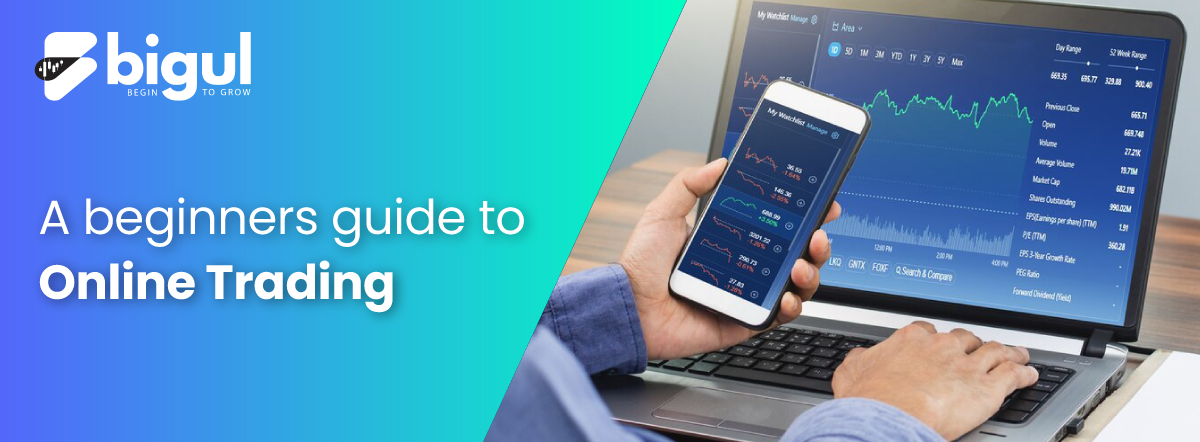Introduction
The stock market, also known as the share market or equity market, is a platform where companies sell their shares to the public to raise capital. People who buy these shares become part-owners of the company and are entitled to a portion of its profits. Online trading has allowed individuals to buy and sell shares from the comfort of their homes. Let us discuss online trading for beginners and how to start trading in the stock market.
Online trading is buying and selling financial securities such as stocks, bonds, and mutual funds through the internet. It is a convenient and accessible way to invest in the stock market from anywhere in the world at any time. The process involves opening a demat account and a trading account with a registered broker, which enables an individual to trade in the stock market. The demat account holds the shares an individual buys, and the trading account is used to place buy and sell orders in the stock market. Online trading platforms provide users with real-time market data and research reports, which help them make informed investment decisions. The process has significantly reduced the transaction costs of buying and selling shares and has given investors greater control over their investments.
What is Online Trading?
Online trading refers to buying and selling financial securities such as stocks, bonds, and mutual funds through the internet. The process involves opening a demat account and a trading account with a broker, which allows an individual to trade in the stock market. The demat account holds the shares an individual buys, and the trading account is used to place buy and sell orders in the stock market.
What are the Advantages of Online Trading?
- Convenience: Online trading has allowed individuals to buy and sell shares from anywhere in the world, anytime. This has made trading in the stock market more convenient and accessible.
- Lower Costs: Online trading has significantly reduced the transaction costs of buying and selling shares. Brokers charge lower fees for online trades compared to traditional offline trades.
- Easy Access to Information: Online trading platforms provide users with real-time market data and research reports, which help them make informed investment decisions.
- Greater Control: Online trading gives investors greater control over their investments. They can monitor their portfolio and make changes to it in real time.
- Faster Execution: Online trading platforms provide faster execution of trades compared to traditional offline trades. This means investors can take advantage of market movements and make quick decisions.
- Transparency: Online trading platforms provide investors with transparency in the trading process. Investors can see the price at which their trades are executed, and they can also see the fees associated with the trades.
- Diversification: Online trading provides investors with the opportunity to diversify their portfolios by investing in a variety of financial securities. This reduces the risk of losses and increases the chances of higher returns.
- Flexibility: Online trading platforms allow investors to trade in different markets and securities. Investors can invest in stocks, bonds, mutual funds, and other financial instruments.
- Education and Resources: Many online trading platforms offer educational resources, such as tutorials, webinars, and research tools, to help investors make informed decisions and improve their trading skills.
How can you Start Online Trading as a Beginners?
Starting online trading as a beginner can be daunting, but with the right approach and guidance, it can be a rewarding experience. Here are some steps to help you get started:
- Learn the Basics: Start by understanding the basics of trading and investing. Read books and articles, and watch tutorials to understand better how the markets work and the different investment options available.
- Choose a Broker: An online broker offers a user-friendly trading platform, reasonable fees, and a good reputation. Look for brokers that offer educational resources, research tools, and customer support.
- Open a Trading Account: Follow the broker’s instructions to open a trading account. You must provide personal and financial information, including your name, address, and social security number.
- Fund Your Account: Deposit funds into your trading account using a bank transfer, credit card, or another payment method.
- Develop a Trading Plan: Create a trading plan that outlines your investment goals, risk tolerance, and trading strategy. This will help you stay focused and disciplined in your trading decisions.
- Start Trading: Use the broker’s platform to execute trades based on your trading plan. Start with small trades and gradually increase your position sizes as you gain experience and confidence.
- Monitor Your Trades: Keep track of your trades and monitor your portfolio regularly. Use the broker’s tools to analyze your performance and identify areas for improvement.
- Continue Learning: Stay informed about market trends, news, and analysis. Attend webinars, read market reports, and seek advice from experienced traders to continue learning and improving your trading skills.
Remember, online trading can be risky, so it’s important to approach it with caution and a long-term perspective. You can increase your chances of success in the markets with proper education, research, and practice.
Conclusion
Online trading has allowed individuals to participate in the stock market and invest in companies they believe in. However, it is essential to remember that investing in the stock market comes with risks, and beginners should educate themselves on the basics of the market and practice caution while investing. Opening a demat and trading account is the first step towards online trading. Choosing a reliable broker and trading platform is crucial to ensure a smooth trading experience.







.jpg)
.jpg)
